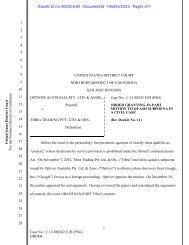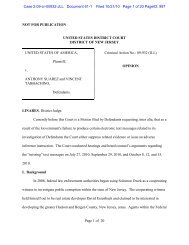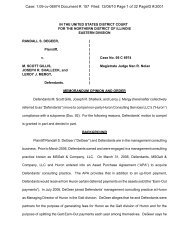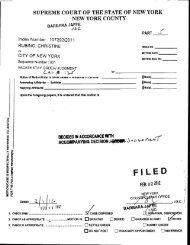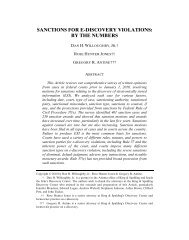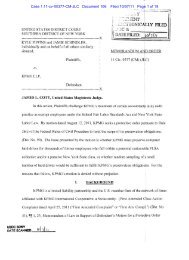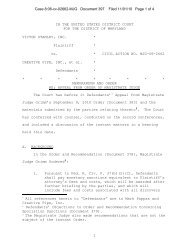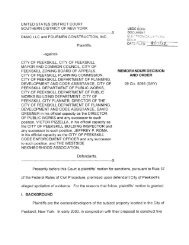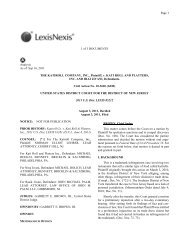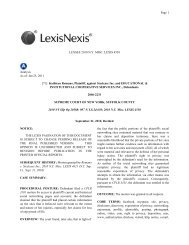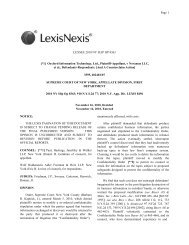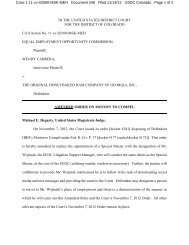Rimkus Consulting Group Inc. v. Cammarata - Ballard Spahr LLP
Rimkus Consulting Group Inc. v. Cammarata - Ballard Spahr LLP
Rimkus Consulting Group Inc. v. Cammarata - Ballard Spahr LLP
You also want an ePaper? Increase the reach of your titles
YUMPU automatically turns print PDFs into web optimized ePapers that Google loves.
Case 4:07-cv-00405 Document 450 Filed in TXSD on 02/19/10 Page 115 of 139<br />
whenever “a person seeks to profit from the use of the secret.” 42<br />
Under Texas law, customer lists may be protected as trade secrets. See Sharma v.<br />
Vinmar Int’l, Ltd., 231 S.W.3d 405, 425 & n.14 (Tex. App.—Houston [14th Dist.] 2007, no<br />
pet.) (collecting cases). But “[a] customer list of readily ascertainable names and addresses<br />
will not be protected as a trade secret.” Guy Carpenter & Co. v. Provenzale, 334 F.3d 459,<br />
467 (5th Cir. 2003) (citing Gaal v. BASF Wyandotte Corp., 533 S.W.2d 152, 155 (Tex. Civ.<br />
App.—Houston [14th Dist.] 1976, no writ)). 43<br />
Texas courts consider three factors to<br />
L.P., No. 14-07-00717-CV, 2008 WL 1991747, at *5 n.5 (Tex. App.—Houston [14 Dist.] 2008, pet. denied)<br />
(mem. op.) (“In its brief, Space Place argues the common law tort of misappropriation does not solely depend<br />
on the existence of a trade secret. Essentially, Space Place argues a claim of misappropriation of confidential<br />
information can survive even if the information does not constitute a trade secret. We disagree. There is no<br />
cause of action for misappropriation of confidential information that is not either secret, or at least<br />
substantially secret.”); Shoreline Gas, <strong>Inc</strong>. v. McGaughey, No. 13-07-364-CV, 2008 WL 1747624, at *7 (Tex.<br />
App.—Corpus Christi 2008, no pet.) (mem. op.) (“Examples of such legitimate, protectable interests [in a<br />
noncompete covenant] include business goodwill, trade secrets, and other confidential or proprietary<br />
information.”); TEX. JUR. Trademark § 54 (“There is no cause of action for misappropriation of confidential<br />
information that is not either secret or at least substantially secret.”). At least one court collapsed them under<br />
the heading “trade secret.” See Parker Barber & Beauty Supply, <strong>Inc</strong>. v. The Wella Corp., 03-04-00623-CV,<br />
2006 WL 2918571, at *14 n.14 (Tex App.—Austin 2006, no pet.) (“The parties alternatively used each of<br />
these terms [trade secret and confidential and proprietary information] at various times. For ease, we will<br />
refer to such information simply as ‘trade secrets.’”).<br />
42 Gen. Univ. Sys., <strong>Inc</strong>. v. HAL, <strong>Inc</strong>., 500 F.3d 444, 450 (5th Cir. 2007) (quoting Trilogy Software, <strong>Inc</strong>. v.<br />
Callidus Software, <strong>Inc</strong>., 143 S.W.3d 452, 464 (Tex. App.—Austin 2004, no pet.)). “Use” is “any exploitation<br />
of the trade secret that is likely to result in injury to the trade secret owner or enrichment to the defendant.”<br />
Id. at 451 (quoting RESTATEMENT (THIRD) OF UNFAIR COMPETITION § 40). “Any misappropriation of trade<br />
secrets, followed by an exercise of control and domination, is considered a commercial use.” Carbo<br />
Ceramics, <strong>Inc</strong>. v. Keefe, 166 F. App’x 714, 721 (5th Cir. 2006) (unpublished) (citing Univ. Computing Co.<br />
v. Lykes-Youngstown Corp., 504 F.2d 518, 542 (5th Cir. 1974), and Garth v. Staktek Corp., 876 S.W.2d 545,<br />
548 (Tex. App.—Austin 1994, writ dism’d)).<br />
43<br />
See Adco Indus. v. Metro Label Corp., No. 05-99-01128-CV, 2000 WL 1196337, at *4 (Tex.<br />
App.—Dallas 2000, no pet.) (not designated for publication) (affirming the trial court’s conclusion that<br />
customer lists and other information were not trade secrets because the defendant was able to purchase a new<br />
customer list and duplicate the process he followed at the plaintiff company to yield information); Miller<br />
Paper Co. v. Roberts Paper Co., 901 S.W.2d 593, 602 (Tex. App.—Amarillo 1995, no writ) (affirming a<br />
temporary injunction preventing the use of a customer list even though “some information contained [in the<br />
list] may have been susceptible to discovery through independent investigation of public material” because<br />
“the record [did] not establish that the appellants so gathered it”); see also Inflight Newspapers, <strong>Inc</strong>. v.<br />
115



